- Home
- Bette Lee Crosby
Beyond the Carousel Page 2
Beyond the Carousel Read online
Page 2
When Edward Bernstein led them into the master bedroom upstairs, she saw French doors opening onto a small balcony and imagined the cool night air washing over them as they slept. The bedroom in their apartment, with one small window that at best opened halfway, was unbearably hot in the summertime.
Almost as if he’d read her mind, Edward crossed over and flung the doors open.
“Even on the hottest day of summer this room is comfortable,” he said. “Feel that breeze?”
Rose nodded, caught the scent of late-blooming jasmine and sighed. “Such a beautiful house. Doesn’t your family hate to leave it?”
He smiled with a shrug of resignation. “We have no choice; I’ve been transferred to Cincinnati.”
“How sad,” Rose replied sympathetically, but a smile curled the corners of her mouth.
Once they’d toured the main rooms, Edward turned to them and said, “If you’re still interested, would you like to see the rest of the place?”
Emory and Rose’s heads bobbed in unison.
Following along like a line of baby ducks, they went through every inch of the house. Climbing the narrow attic stairs, they peeked into a tiny dormer room that overlooked the street. Even though the room was still unfinished, Rose could easily imagine it with tieback curtains and a window seat for reading.
Room by room, she began to see her family settling into the house. Laura in the back bedroom that overlooked a dogwood tree in full bloom. The small study turned into a sewing room. A spare bedroom for the grandchildren they might one day have.
After she’d mentally placed Laura in the room she already thought of as the dogwood room, Rose asked about schools in the area.
“The elementary school is just two blocks over,” Edward replied. “It’s a wonderful school; Nora Kelly, the fifth grade teacher, is an absolute gem.”
“I’m going into the sixth grade,” Laura volunteered.
“Well, then, you’d have Mister Morris,” Edward said. “He’s everybody’s favorite.”
Laura looked at Emory and Rose and grinned.
As they headed down for a look at the furnace, Edward snapped on the switch at the top of the staircase and the basement was flooded with light. Trailing behind Emory, Rose poked a finger in his back to catch his attention. When he turned to look at her, she gave an eager nod and mouthed the word “yes.” Long before Edward showed them the coal bin and pointed out that the furnace was a steel-riveted Lenox that sent steam heat to every room in the house, Rose had all but moved in.
When they returned to the living room, she smiled sweetly and excused herself.
“Laura and I will explore the backyard,” she said, “while you gentlemen go about your business.”
It was nearly an hour before Emory came out calling for them to leave. Although Rose was bursting with curiosity, she waited until they were nearly to Broad Street. Then she said, “Well?”
“Well what?” Emory teased.
“Did you get the house?”
Emory walked with his back straight and his chest puffed out as he answered, “Yes, I did, and some of the furniture as well.”
Ignoring the ladylike behavior she prided herself in having, Rose let out a squeal of delight that could be heard halfway down Broad Street.
Rose Hawthorne
Years ago I spotted a blue silk change purse dropped on the street, and I picked it up. Inside there were two one-dollar bills, a quarter and three dimes. No name or identification, just the money.
I liked the feel of that soft silk in my hand, so I slid it into my pocket and walked off. Sure, I glanced around and didn’t see anyone looking like they’d lost a purse, but I didn’t go out of my way to find the owner either. We were struggling to make ends meet back then, and I couldn’t help thinking of how that money would buy enough groceries for a week. That day I bought a nice fat roasting chicken to cook for dinner, a piece of chocolate for me and a candy stick for Laura. I never mentioned finding the purse to anyone, not even Emory.
All that week I kept telling myself there was no crime in keeping the change purse because I had no way of knowing who to return it to, but no matter how hard I tried to convince myself I still felt guilty about keeping something I wasn’t deserving of.
That’s kind of how I feel about the house. I want it a thousand times more than I wanted that piece of chocolate, but I still feel guilty having it.
I keep asking myself why. Why would a daddy Emory never even knew give us all that money? I feel frightened that a day or a week or a month from now someone will show up to tell us it was all a mistake, and we have to give the money back.
When the sensible side of my brain thinks about that possibility, I focus on the twelve years of washing my face in icy cold water and hauling groceries up three long flights of stairs. Then it’s like having that blue silk purse all over again.
Frivolous Things
On the first day of September, the Hawthorne family moved out of the cold water flat and into a house grander than anything they’d ever imagined owning. As luck would have it, Henry Bernstein was moving into an apartment with a spectacular view of the Ohio River but considerably less room. He had no need of the large dining room set, the wicker porch furniture and several other items, so he’d sold them to Emory for next to nothing. The telephone table in the center hall he’d thrown in for free.
Although the apartment in Ida Poole’s house had seemed painfully cramped, their meager possessions appeared lost in such a large house. This was particularly true of Laura’s room. Back in the apartment she’d slept on a divan small enough to fit in the alcove that served as her room.
Emory eyed the near empty expanse. “Seems to me you need some more furniture in here.”
“I don’t have anything else,” Laura answered.
“Well, then, I guess we’ll have to go shopping and find some proper furniture.”
Nothing more was said about it until late that night when Emory and Rose were lying side by side in the old bed they’d brought from the apartment. The mattress sagged from years of wear, but with the smell of jasmine in the air and a soft breeze cooling them it seemed a bit more comfortable.
Although they were both weary from the day of moving and unpacking, she slid closer and eased her head onto his shoulder. For a few moments there was only the sound of their hearts beating in a matched rhythm. Then she spoke.
“You did a good thing buying this house, Emory.”
She raised herself up on her elbow then bent and kissed his mouth.
“I know if it were left up to me I would have said let’s get a smaller, less expensive place, but now that we’re here I can feel how special this house is.”
“I’ve still got almost two thousand dollars in the bank,” he reminded her.
“Thank goodness.” She dropped down and snuggled into the crook of his arm. “We need to save every penny just in case…”
“In case of what?”
Rose grew up with a mama who never once squandered a cent. From the time she was old enough to ask for candy, Rose was taught that such requests were frivolous and pennies were to be saved for tomorrow, “just in case” her mama had said. But she’d never explained what the “case” might be.
Rose thought back on this and gave a weighted sigh.
“For a rainy day,” she finally said. “A time when we have less than we have now.”
“That time has come and gone,” Emory replied. “We’ve seen our share of hard times and somehow pulled through. Now we’ve moved on to good times, so let’s just relax and enjoy them.”
For several long moments there was only silence as they lay together feeling the rise and fall of each other’s breath.
“It’s hard to change,” she finally said.
Emory gave her shoulder an affectionate squeeze. “I know.”
Another few moments of silence passed. It was during those moments of silence Emory could gather his thoughts.
“Please try to trust my judgmen
t,” he said earnestly. “I swear I will never do anything to put you or Laura in harm’s way.”
“I know that,” she replied. “But what if something unforeseen happens? Something you have no control over.”
“What if no such thing ever happens?” he answered in a voice that was not mocking but gentle and tender. “This house is bought and paid for. It’s ours for the rest of our lives. We can pinch pennies and worry about something that may never happen, or we can spend our time and money enjoying each day.”
A labored sigh came up from the depths of her chest.
“I realize what you say makes a lot of sense, but I can’t help thinking if something—”
“No matter what happens, I’ll take care of my girls,” he cut in before she could finish the thought. “And if we do happen upon bad times, we’ll still have these good times to look back on.”
“I suppose,” she answered reluctantly.
Emory turned his face to hers and kissed her. It was a soft and tender kiss that asked for nothing in return.
“The thing I want most in life is to make you happy,” he said. “My happiness comes from doing these things for you and Laura. Please don’t take that joy from me.”
With her cheek pressed to his, Rose blinked back the tears that threatened to spill over.
“I won’t,” she whispered.
It was a promise she made to both Emory and herself. No matter how frivolous a thing might seem, she vowed to stay true to that promise of not taking his joy away.
Change didn’t come easily, but Rose tried. The following Saturday Emory suggested they go to J.C. Penney and buy a bedroom set for Laura.
“She’s growing up,” he said, “and after eleven years of sleeping in an alcove, she deserves to have a nice room of her own.”
A wrinkle crossed Rose’s brow. Her inclination was to look for a chest of drawers and maybe a chair at the Good Shepherd Thrift Shop. Not a bedroom set per se but a few used pieces still in good condition. She might have suggested this, but she’d caught sight of the pride he took in making such a suggestion.
Please don’t take that joy from me.
“That’s a fine idea,” she replied.
When Emory plunked down $249 for a bedroom set that included two nightstands, a full-size bed, dresser, mirror and chest of drawers, Rose had to walk away.
“I’ll be in the fabric shop,” she said.
She didn’t mention it, but her thought was before he came around to suggesting they buy curtains and a coverlet for the new bedroom she could stitch them herself and save the money.
That day she bought twenty-two yards of pale pink muslin, and for the next two weeks she sat at the sewing machine pumping her foot back and forth on the pedal as she stitched dainty little ruffles along the edge of tieback curtains and a coverlet. When they were finished, she eyed them and scrunched her nose. On a Tuesday afternoon, with no one pushing her to do so, Rose returned to J.C. Penney and bought nine yards of grosgrain ribbon trim. It was the first frivolous purchase she could ever remember herself making.
On Wednesday afternoon when Laura came from school and saw her room she squealed with delight. Dropping her school bag on the floor, she darted down the stairs to the kitchen and hugged her mama so tight Rose could barely breathe.
“Thank you, thank you, thank you!” she said. “It’s the most beautiful room I’ve ever seen!” Seconds later she was on the telephone with her new best friend, Rebecca, gushing about her wonderful surprise.
Rose was in the middle of chopping onions for their dinner stew, but as she listened to Laura tell of the ruffles and fancy ribbon trim her eyes filled with tears. Not from the onions but because she’d discovered the joy of giving Emory had spoken of.
Today is Tomorrow
You might think with Laura being as close to her mama as she was, she’d pick up the thread of Rose’s frugality but she didn’t. She had her mama’s hazel-colored eyes and loose curls, but she had her daddy’s personality. Every day was a day to be lived, and this new environment was a world waiting to be explored.
Laura turned twelve that first year, and up until then she’d been a somewhat reserved child. In their tiny apartment she’d seemed content to sit at the kitchen table watching her mama cook or snuggle into the alcove with a book carried home from the library. For hours on end she would read, jumping from one story into the next.
Now all of a sudden she’d become a giggly girl with a bevy of friends who drifted in and out of the house. Overnight, it seemed, Rose began finding books with the bookmark tucked into the very first chapter.
“Aren’t you going to finish this?” she’d ask.
Laura inevitably answered that she would as soon as she had time; then she’d dart out the door because Peggy, Sue Ellen or Rebecca was waiting for her.
In addition to hot water and electricity the Hawthorne family had a telephone sitting on the hall table. Every time it jingled, Laura shouted, “I’ll get it!” and came running. It was almost always one of her friends calling. At times Rose would catch snippets of a conversation about movie stars or secret friendships and wonder if she had ever been that young and giddy. If so, she could no longer remember. What she did remember were the endless days of helping her mother with the sewing, snipping the ends of string beans and holding her tongue unless she’d been spoken to.
* * *
After that first year in the house, the days fairly flew by. One year turned into two, and in a flash it became three. Twice Emory was given an increase in pay, and the third year he was promoted to the first shift supervisor. Laura grew nearly seven inches in those years. In what seemed the blink of an eye, she went from a stick thin girl to a shapely teen with friends attached to both arms.
The only one who remained relatively the same was Rose, but that was as she wanted it. Old habits were hard to shake loose, and in those early years just the thought of spending a nickel frivolously was like a burr under her skin. Although she didn’t approve of wasting money for a standing rib roast simply because it was Sunday, seeing her family happy somehow justified such purchases. The problem was once she came to accept spending money on those things, Emory moved on to bigger things.
The day they went to the J.C. Penney store to pick out a new living room set, she broke out in hives.
She’d not said a word of protest when he suggested the new living room furniture, but as they stood there listening to the salesman tell of hand-tied springs and fabric durability Emory noticed Rose picking at the back of her neck. He moved closer and saw the rash blossoming at the edge of her collar.
Affectionately looping his arm through hers, he told the salesman, “We’ll think it over and come back if we decide to place an order.”
He steered Rose toward the door. “It’s such a lovely day, let’s walk through the park.”
There was no further mention of the living room set. They walked for nearly an hour then stopped at the Garden Inn for coffee. As they sat across from one another, Emory spoke of possibly putting a small patch of tomato plants in the backyard.
“Last year Herb Korselman set out six plants and got tomatoes enough for the whole summer,” he said. “I’m thinking eight plants…”
Rose was only half listening. Her thoughts were stuck on the velour living room set. The truth was the set they’d brought to the house was worn threadbare. The arm of the sofa wobbled if you sat close to it, and the chair had a hole in the spot where there once was a button. She and Emory had gotten that set the year they were married, and it was a hand-me-down back then.
Times were different now. Emory was making a good salary, and they had money in the bank. They could afford a new living room set, and she wanted Laura to feel comfortable about bringing friends to the house. Rose thought back to a few days earlier when Laura hustled Rebecca and Josephine past the living room and up to her bedroom. She hadn’t said anything, but it was obvious that the dreary looking sofa was an embarrassment.
She folded her n
apkin and slid it under the cup. It was a thing she’d done by force of habit for as long as she could remember. She was always protecting things, skimping on today so there would be a safe tomorrow. Now today was yesterday’s tomorrow, and she was still skimping. Next year was this year’s tomorrow, and before long Laura would be married and gone. Then they’d have no need of a big house or a new sofa.
Emory was in the middle of telling how the tomato plants would do best on the south side of the house, when she cut in saying, “I’m sorry.”
“Sorry?”
“About the living room set.”
“There’s no need to be sorry. We can wait a while until you feel—”
Rose shook her head. “You were right. We need one now. Let’s go back to the store and order that furniture.”
Emory stretched his arm across the table and took her hand in his. “Are you sure about this?”
She ducked her head and gave a sheepish grin. “I’m sure.”
“What about the end tables and lamps? Would you like to wait on those?”
“No. We can go ahead and order those too.”
Emory chuckled. “What brought about this change of heart?”
“I realized today is the tomorrow I worried about yesterday.”
When they left the coffee shop, Rose and Emory walked back across the park and turned toward the J.C. Penney store. This time it was different. Rose’s step was a bit jauntier, and her smile stretched across her face.
Much to Emory’s surprise, after they’d placed the order for a sofa, matching chair, a coffee table and two end tables with lamps to set atop them, Rose suggested they stop and look at draperies.
They browsed the department for nearly an hour. Rose went along the entire display rack, fingering the fabric of each panel and eyeing the stitches that at times were less than uniform. In the end she told Emory the stitching wasn’t quite up to par, but the truth was she’d decided she could make the same draperies for less than half the cost.

 Emily, Gone
Emily, Gone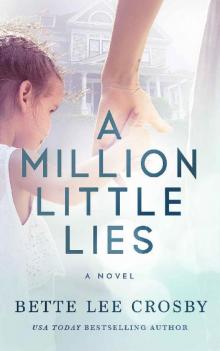 A Million Little Lies
A Million Little Lies Previously Loved Treasures
Previously Loved Treasures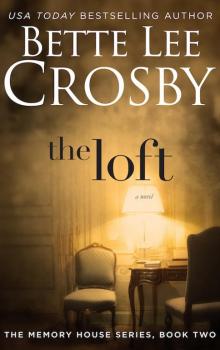 The Loft
The Loft Spare Change
Spare Change Memory House: Memory House Collection (Memory House Series Book 1)
Memory House: Memory House Collection (Memory House Series Book 1) Silver Threads
Silver Threads Wishing for Wonderful: The Serendipity Series, Book 3
Wishing for Wonderful: The Serendipity Series, Book 3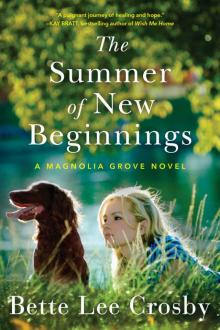 The Summer of New Beginnings: A Magnolia Grove Novel
The Summer of New Beginnings: A Magnolia Grove Novel The Regrets of Cyrus Dodd
The Regrets of Cyrus Dodd Passing Through Perfect
Passing Through Perfect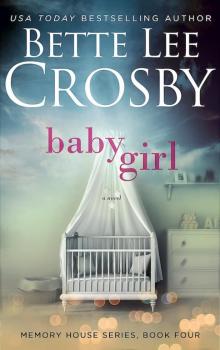 Baby Girl
Baby Girl Jubilee's Journey
Jubilee's Journey Beyond the Carousel
Beyond the Carousel What the Heart Remembers
What the Heart Remembers Cupid's Christmas
Cupid's Christmas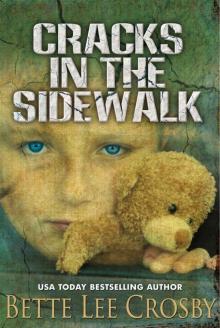 Cracks in the Sidewalk
Cracks in the Sidewalk Blueberry Hill
Blueberry Hill The Twelfth Child
The Twelfth Child A Year of Extraordinary Moments (A Magnolia Grove Novel)
A Year of Extraordinary Moments (A Magnolia Grove Novel)